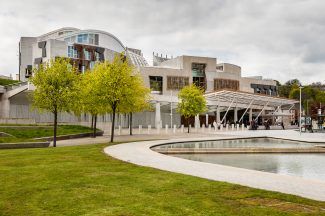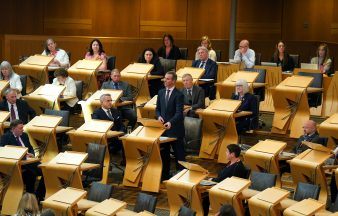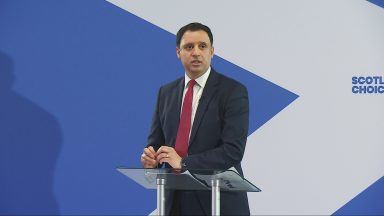The Scottish Government has failed in a bid to postpone a legal showdown with the UK Government over Westminster’s decision to block controversial gender recognition reforms.
Lawyers for Scotland’s ministers went to the Court of Session on Friday to seek a cancellation of a hearing on the matter which was scheduled for September 2023.
Advocate Paul Reid told judge Lady Haldane that the postponement was needed because of an appeal brought to the Inner House of the Court of Session by For Women Scotland.
Mr Reid is acting for the Scottish Government in a judicial review which is being brought to the Court of Session by Holyrood.
It believes that the UK Government acted unlawfully in blocking legislation to make it quicker and easier for transgender people to change their legally recognised gender.
On Friday, Mr Reid told Lady Haldane that the outcome of the For Women appeal could have ramifications for the Scottish Government’s judicial review.
He said this was because both cases had issues in common.
However, lawyers for the UK Government’s law officer, the Advocate General Lord Stewart of Dirleton KC, urged Lady Haldane to refuse the postponement request.
David Johnston KC told Lady Haldane that the hearings could proceed as they dealt with different legal issues. He also said that the Scottish Government knew of For Women Scotland’s appeal at the time the September hearing was arranged and this request came “too late”.
He said it was in the public interest to have the matter heard as soon as possible.
Lady Haldane agreed with the submissions made to her by Mr Johnston and she refused the Scottish Government’s request.
She said: “In any event, I do not accept that the issues in the For Women Scotland case and the issues in the this motion brought by the petitioners are the same.
“In the event that For Women Scotland is successful in the Inner House, further submissions on the case can be made for whatever they see is appropriate.
“For these reasons, I refuse the motion.”
The Scottish Government has brought the judicial review over the UK Government’s decision to use its powers under Section 35 of the 1998 Scotland Act earlier this year.
Section 35 gives the secretary of state for Scotland the power, in certain circumstances, to veto legislation enacted by the Scottish Parliament, even if it deals with a devolved matter.
Scottish secretary Alister Jack made a Section 35 order in January 2023 to prevent Holyrood’s Gender Recognition Reform Act from becoming law.
The legislation allowed people to change genders without the need for a gender recognition certificate and for them to be recognised as their chosen gender in life.
This prompted the social justice secretary Shirley-Anne Somerville to say the Scottish Government needed to bring the judicial review.
She said the Section 35 order was “an unprecedented challenge to the Scottish Parliament’s ability to legislate on clearly devolved matters” and “risks setting a dangerous constitutional precedent”.
Legal papers lodged by the Advocate General in the current case state that Jack was correct to make the section 35 order.
It states: “There were reasonable grounds for the secretary of state to believe that the relevant provisions would have an adverse effect on the operation of the law as it applies to reserved matters.
“The order is accordingly lawful.”
It also states that the Scottish legislation could undermine the 2004 Gender Recognition Act.
“The secretary of state relies upon concerns about increased fraudulent applications as a consequence of there being in his view more limited safeguards,” the papers continued.
“Before he made the order, the Secretary of State took advice… His belief that he had sufficient information available to him to make the order was one that was open to him.
“It follows, as a matter of logic from their terms, that the amendments in the bill would reduce the safeguards in the 2004 Act against fraudulent or malign applications.
“It was open to the secretary of state to find that the effect is an ‘adverse’ one in the operation of the law as it applies to reserved matters for the purposes of Section 35 of the Scotland Act.”
Lawyers for the feminist campaign group For Women Scotland are set to address civil appeal judges in October 2023 with regard to a decision made earlier this year by Lady Haldane.
For Women Scotland believes that Lady Haldane’s ruling with regard to Scottish Government’s changes to legislation called the Gender Representation on Public Boards Act. The Act is designed to increase the number of women who sit on public boards in Scotland.
Lady Haldane’s ruling stated that “sex” provisions in the Equality Act 2010 could mean that men who have changed their gender to women – and who have a gender recognition certificate – could be regarded as being the same as women who were born female.
This means that trans women could sit on public boards and fulfil the legislation’s requirement for public boards to be 50% female in their make up.
On Friday, Mr Reid asked for the hearing to be postponed as the For Women Scotland appeal could have consequences for the Scottish Government’s case.
He said: “The Lord Advocate’s position is that the present hearing should be discharged and a new date be arranged.
“To not do so would create the material risk of complication in case of the outcome of the case in the Inner House.”
Mr Johnston asked Lady Haldane to reject the motion. He said that the two cases dealt with separate issues and that the matters could proceed as planned.
The court heard that the Scottish Government’s petition concerned whether the UK government acted lawfully in blocking the legislation.
The court also heard the For Women appeal focuses on whether Lady Haldane’s ruling on whether the definition of sex in equalities legislation could include transgender women was correct.
He said: “The issue in the present case deals with the rationality of the Minister in making the decision and whether it could be made in accordance of the operation of the law.”
Mr Johnston also told Lady Haldane that the Scottish Government knew about the For Women appeal at the time arranged the September 2023 hearing earlier this year.
He said the request to postpone the hearing came “too late” and that it was in the public interest for the Court of Session to hear the section 35 appeal as soon as possible.
Mr Johnston added: “Great pains were taken to fix dates which suited the parties. This motion comes too late.
“My motion is for you to refuse this motion.”
Lady Haldane agreed and rejected the Scottish Government’s submissions.
Follow STV News on WhatsApp
Scan the QR code on your mobile device for all the latest news from around the country


 Max Joss
Max Joss

























